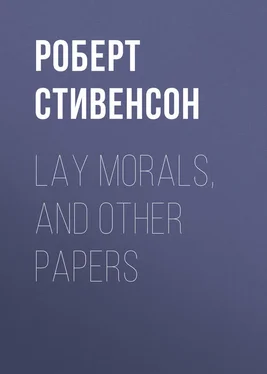Роберт Стивенсон - Lay Morals, and Other Papers
Здесь есть возможность читать онлайн «Роберт Стивенсон - Lay Morals, and Other Papers» — ознакомительный отрывок электронной книги совершенно бесплатно, а после прочтения отрывка купить полную версию. В некоторых случаях можно слушать аудио, скачать через торрент в формате fb2 и присутствует краткое содержание. Жанр: literature_19, foreign_antique, foreign_prose, essays, на английском языке. Описание произведения, (предисловие) а так же отзывы посетителей доступны на портале библиотеки ЛибКат.
- Название:Lay Morals, and Other Papers
- Автор:
- Жанр:
- Год:неизвестен
- ISBN:нет данных
- Рейтинг книги:3 / 5. Голосов: 1
-
Избранное:Добавить в избранное
- Отзывы:
-
Ваша оценка:
- 60
- 1
- 2
- 3
- 4
- 5
Lay Morals, and Other Papers: краткое содержание, описание и аннотация
Предлагаем к чтению аннотацию, описание, краткое содержание или предисловие (зависит от того, что написал сам автор книги «Lay Morals, and Other Papers»). Если вы не нашли необходимую информацию о книге — напишите в комментариях, мы постараемся отыскать её.
Lay Morals, and Other Papers — читать онлайн ознакомительный отрывок
Ниже представлен текст книги, разбитый по страницам. Система сохранения места последней прочитанной страницы, позволяет с удобством читать онлайн бесплатно книгу «Lay Morals, and Other Papers», без необходимости каждый раз заново искать на чём Вы остановились. Поставьте закладку, и сможете в любой момент перейти на страницу, на которой закончили чтение.
Интервал:
Закладка:
I do not say but that my friend was a little too curious and partial in his view; nor thought too much of himself and too little of his parents; but I do say that here are some scruples which tormented my friend in his youth, and still, perhaps, at odd times give him a prick in the midst of his enjoyments, and which after all have some foundation in justice, and point, in their confused way, to some more honourable honesty within the reach of man. And at least, is not this an unusual gloss upon the eighth commandment? And what sort of comfort, guidance, or illumination did that precept afford my friend throughout these contentions? ‘Thou shalt not steal.’ With all my heart! But am I stealing?
The truly quaint materialism of our view of life disables us from pursuing any transaction to an end. You can make no one understand that his bargain is anything more than a bargain, whereas in point of fact it is a link in the policy of mankind, and either a good or an evil to the world. We have a sort of blindness which prevents us from seeing anything but sovereigns. If one man agrees to give another so many shillings for so many hours’ work, and then wilfully gives him a certain proportion of the price in bad money and only the remainder in good, we can see with half an eye that this man is a thief. But if the other spends a certain proportion of the hours in smoking a pipe of tobacco, and a certain other proportion in looking at the sky, or the clock, or trying to recall an air, or in meditation on his own past adventures, and only the remainder in downright work such as he is paid to do, is he, because the theft is one of time and not of money, – is he any the less a thief? The one gave a bad shilling, the other an imperfect hour; but both broke the bargain, and each is a thief. In piecework, which is what most of us do, the case is none the less plain for being even less material. If you forge a bad knife, you have wasted some of mankind’s iron, and then, with unrivalled cynicism, you pocket some of mankind’s money for your trouble. Is there any man so blind who cannot see that this is theft? Again, if you carelessly cultivate a farm, you have been playing fast and loose with mankind’s resources against hunger; there will be less bread in consequence, and for lack of that bread somebody will die next winter: a grim consideration. And you must not hope to shuffle out of blame because you got less money for your less quantity of bread; for although a theft be partly punished, it is none the less a theft for that. You took the farm against competitors; there were others ready to shoulder the responsibility and be answerable for the tale of loaves; but it was you who took it. By the act you came under a tacit bargain with mankind to cultivate that farm with your best endeavour; you were under no superintendence, you were on parole; and you have broke your bargain, and to all who look closely, and yourself among the rest if you have moral eyesight, you are a thief. Or take the case of men of letters. Every piece of work which is not as good as you can make it, which you have palmed off imperfect, meagrely thought, niggardly in execution, upon mankind who is your paymaster on parole and in a sense your pupil, every hasty or slovenly or untrue performance, should rise up against you in the court of your own heart and condemn you for a thief. Have you a salary? If you trifle with your health, and so render yourself less capable for duty, and still touch, and still greedily pocket the emolument – what are you but a thief? Have you double accounts? do you by any time-honoured juggle, deceit, or ambiguous process, gain more from those who deal with you than it you were bargaining and dealing face to face in front of God? – What are you but a thief? Lastly, if you fill an office, or produce an article, which, in your heart of hearts, you think a delusion and a fraud upon mankind, and still draw your salary and go through the sham manœuvres of this office, or still book your profits and keep on flooding the world with these injurious goods? – though you were old, and bald, and the first at church, and a baronet, what are you but a thief? These may seem hard words and mere curiosities of the intellect, in an age when the spirit of honesty is so sparingly cultivated that all business is conducted upon lies and so-called customs of the trade, that not a man bestows two thoughts on the utility or honourableness of his pursuit. I would say less if I thought less. But looking to my own reason and the right of things, I can only avow that I am a thief myself, and that I passionately suspect my neighbours of the same guilt.
Where did you hear that it was easy to be honest? Do you find that in your Bible? Easy! It is easy to be an ass and follow the multitude like a blind, besotted bull in a stampede; and that, I am well aware, is what you and Mrs. Grundy mean by being honest. But it will not bear the stress of time nor the scrutiny of conscience. Even before the lowest of all tribunals, – before a court of law, whose business it is, not to keep men right, or within a thousand miles of right, but to withhold them from going so tragically wrong that they will pull down the whole jointed fabric of society by their misdeeds – even before a court of law, as we begin to see in these last days, our easy view of following at each other’s tails, alike to good and evil, is beginning to be reproved and punished, and declared no honesty at all, but open theft and swindling; and simpletons who have gone on through life with a quiet conscience may learn suddenly, from the lips of a judge, that the custom of the trade may be a custom of the devil. You thought it was easy to be honest. Did you think it was easy to be just and kind and truthful? Did you think the whole duty of aspiring man was as simple as a horn-pipe? and you could walk through life like a gentleman and a hero, with no more concern than it takes to go to church or to address a circular? And yet all this time you had the eighth commandment! and, what makes it richer, you would not have broken it for the world!
The truth is, that these commandments by themselves are of little use in private judgment. If compression is what you want, you have their whole spirit compressed into the golden rule; and yet there expressed with more significance, since the law is there spiritually and not materially stated. And in truth, four out of these ten commands, from the sixth to the ninth, are rather legal than ethical. The police-court is their proper home. A magistrate cannot tell whether you love your neighbour as yourself, but he can tell more or less whether you have murdered, or stolen, or committed adultery, or held up your hand and testified to that which was not; and these things, for rough practical tests, are as good as can be found. And perhaps, therefore, the best condensation of the Jewish moral law is in the maxims of the priests, ‘neminem lædere’ and ‘suum cuique tribuere.’ But all this granted, it becomes only the more plain that they are inadequate in the sphere of personal morality; that while they tell the magistrate roughly when to punish, they can never direct an anxious sinner what to do.
Only Polonius, or the like solemn sort of ass, can offer us a succinct proverb by way of advice, and not burst out blushing in our faces. We grant them one and all and for all that they are worth; it is something above and beyond that we desire. Christ was in general a great enemy to such a way of teaching; we rarely find him meddling with any of these plump commands but it was to open them out, and lift his hearers from the letter to the spirit. For morals are a personal affair; in the war of righteousness every man fights for his own hand; all the six hundred precepts of the Mishna cannot shake my private judgment; my magistracy of myself is an indefeasible charge, and my decisions absolute for the time and case. The moralist is not a judge of appeal, but an advocate who pleads at my tribunal. He has to show not the law, but that the law applies. Can he convince me? then he gains the cause. And thus you find Christ giving various counsels to varying people, and often jealously careful to avoid definite precept. Is he asked, for example, to divide a heritage? He refuses: and the best advice that he will offer is but a paraphrase of that tenth commandment which figures so strangely among the rest. Take heed, and beware of covetousness . If you complain that this is vague, I have failed to carry you along with me in my argument. For no definite precept can be more than an illustration, though its truth were resplendent like the sun, and it was announced from heaven by the voice of God. And life is so intricate and changing, that perhaps not twenty times, or perhaps not twice in the ages, shall we find that nice consent of circumstances to which alone it can apply.
Читать дальшеИнтервал:
Закладка:
Похожие книги на «Lay Morals, and Other Papers»
Представляем Вашему вниманию похожие книги на «Lay Morals, and Other Papers» списком для выбора. Мы отобрали схожую по названию и смыслу литературу в надежде предоставить читателям больше вариантов отыскать новые, интересные, ещё непрочитанные произведения.
Обсуждение, отзывы о книге «Lay Morals, and Other Papers» и просто собственные мнения читателей. Оставьте ваши комментарии, напишите, что Вы думаете о произведении, его смысле или главных героях. Укажите что конкретно понравилось, а что нет, и почему Вы так считаете.












